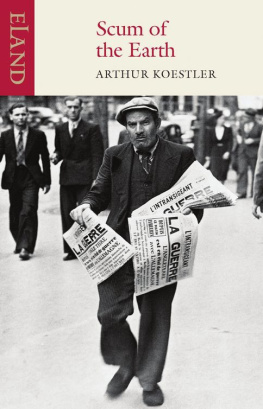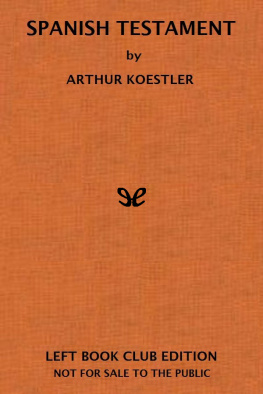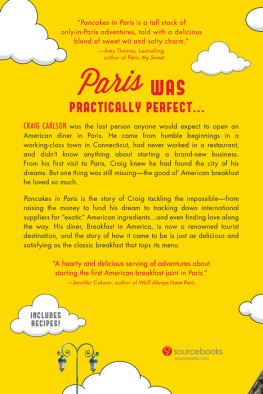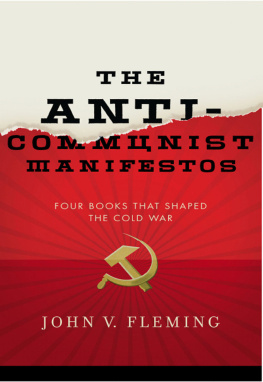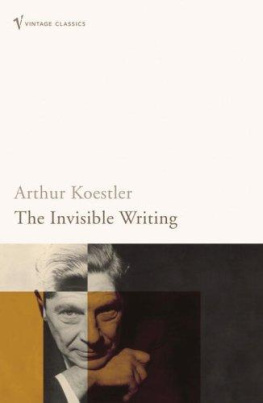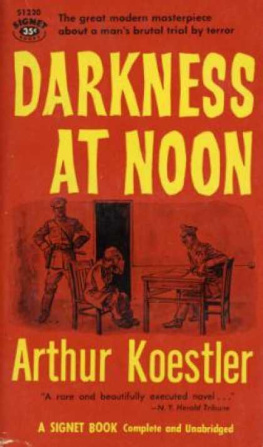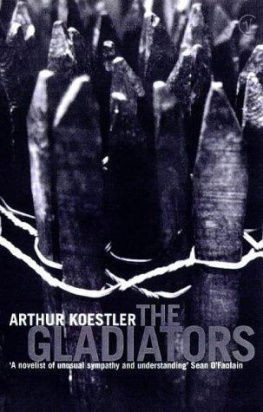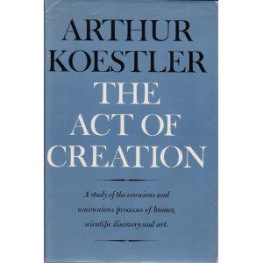Scum of the Earth was the first book that I wrote in English. It was written in January-March 1941, immediately after I had escaped from occupied France to England. My friends were either in the hands of the Gestapo, or had committed suicide, or were trapped, seemingly without hope, on the lost Continent. The agony of the French collapse was still reverberating through my mind as a scream of terror echoes in ones ear. Within the previous four years I had been imprisoned in three different countries: in Spain, under sentence of death, during the Civil War: as a political suspect and undesirable alien in France; finally, having escaped to England with false papers at the height of the Fifth Column scare, I was locked up, pending investigation, in Pentonville Prison. The book was written in the blacked-out London of the night-blitz, in the short breathing space between Pentonville and enlistment in the Pioneer Corps. Not only time was short, but money too. Having lost all my possessions in France, I arrived in England penniless, and had to live on the advance which the original publisher of the book paid me: five pounds a week during ten weeks, plus an additional ten pounds on delivery of the manuscript, minus the cost of hiring a typewriter and sundry other expenses which were deducted from the weekly five pounds.
Re-reading the book for the first time after thirteen years, I find these outer and inner pressures reflected in its apocalyptic mood, its spontaneity and lack of polish. Some pages now appear insufferably maudlin: others are studded with clichs which at the time, however, seemed original discoveries to the innocent explorer of a new language-continent ; above all the text betrays the fact that there had been no time for correcting proofs. To remedy these faults would mean to re-write the book, and that would be a pointless undertakingfor, if the book has any value, it lies in its documentary period character. I have confined myself to correcting only the most glaring gallicisms, germanisms and grammatical errorsand to throwing out adjectives and similes at a set rate of one in five.
The period character of the book is particularly evident in its political outlook. It is the romantically and navely Leftish outlook of the pink thirties. I had been a member of the Communist Party for seven years; I had left it in disgust and despair in 1938, but certain illusions about Soviet Russia and the international solidarity of the working classes as the best guarantee of peace lingered on, and are reflected throughout the book. That again is typical of the timea time when my late friend George Orwell, who was of a less romantic disposition that I, could write that:
the war and the revolution are inseparable We know very well that with its present social structure England cannot survive. We cannot win the war without introducing Socialism. Either we turn this war into a revolutionary war or we lose it.
If all this is dated, other aspects of the story have, alas, remained painfully topical. The sickness of the French body politic, which led to the debacle of 1940, is again threatening to bring disaster to what remains of Europe. Many passages of the book, e.g. the outburst of Marcel, the garage mechanic (p. 56), are textually applicable to the present situationonly the word Fascism has to be replaced by its contemporary equivalent, Totalitarianism.
To protect the personages who appear in the book from Gestapo persecution, I had to camouflage them. For similar reasons certain episodes had to be passed over in silence. The friends who were hiding me from the French police in Paris (p. 163), and who succeeded in obtaining for me a travelling permit, were the late Henri Membr, secretary of the French PEN Club, and that admirable woman of letters, Adrienne Monnier. The real name of Pre Darrault (pp. 198 ff.), is Pre Pieprot, O.D., at present Secretary General of the International Congress for Criminology. Albert is the German-American author Gustav Regler. Among the various characters in Hut No. 33 of the concentration camp at Le Vernet, who are only referred to by initial letters, were the German Communist leaders Paul Merker and Gerhardt Eisler. Finally, there is Mario, about whom I must speak at some length.
Marios real name is Leo Valliani. He was born in 1909 at Fiume. He was seventeen, and a student of Social History, when Mussolini out-lawed the Italian Opposition and suppressed civil liberties. Valliani joined the only underground opposition party then existing in Italy: the Communists. At the age of nineteen he was arrested and deported for one year to the island of Ponza. After his release he went back to the Communist underground as a member of its committee for the Istria region. Arrested again at the age of twenty-one, he was sentenced to twelve years imprisonment. Of these he served six years: the other half was spared him by an amnesty. In 1936 he escaped to Paris, where he edited QueFaire? a political monthly which represented the last attempt to create a democratic opposition within the Communist International. He broke with Communism after the Stalin-Hitler pact and joined Carlo Rosselis movement Justice and Liberty, which became during the war the Italian Action Party. In October 1939 he was arrested by the French police and sent to the camp of Le Vernet, where he spent a year. In October 1940 he escaped from Le Vernet to Morocco, where he worked with the French Resistance. After a brief breathing spell in Mexico, he returned in October 1943, with British help, on a secret mission to Italy. He crossed the German lines north of Naples, and after five days reached Rome on foot. He was appointed Secretary of the illegal Action Party, which he represented in the Command of the Italian Resistance. In March-April 1945, he was one of the three members of the Central Insurrectional Committee which organised the rising against the Nazis and ordered Mussolinis execution. In 1946 he was elected to the Constituent Assembly. Three years later he retired from politics and became a scholar again. He has since published his memoirs of the Italian Resistance and a number of books and essays, ranging from a History of the Socialist Movement to a critical evaluation of the philosophy of Benedetto Croce.
Mario has remained my closest friend during the fifteen years since we first met in the concentration camp. As he was still a prisoner in France at the time when I wrote Scum of the Earth, not only his name, but also his story, had to be camouflaged; this explains certain minor discrepancies between the biographical data in this preface and in the text.
The narrative ends with my arrival in 1940 in Marseilles, where I joined an escape party of British officers. For security reasons the story of our escape via Oran to Casablanca, then by fishing boat to Lisbon and thus eventually to England, could not be told at the time and there would be no point in enlarging on it to-day. It is an escape story like dozens of others that have been told since, and less eventful than most.
The last stage of this long trek to freedom was Pentonville Prison, where I spent six peaceful weeks in solitary confinement during the later part of the blitz. Most of the timeon the average fifteen to sixteen hours a daythe cell was pitch dark, because the alert usually came with the fading of daylight, and the lights in the cell were then switched off to prevent us presumptive Fifth Columnists from signalling to the raiders.

